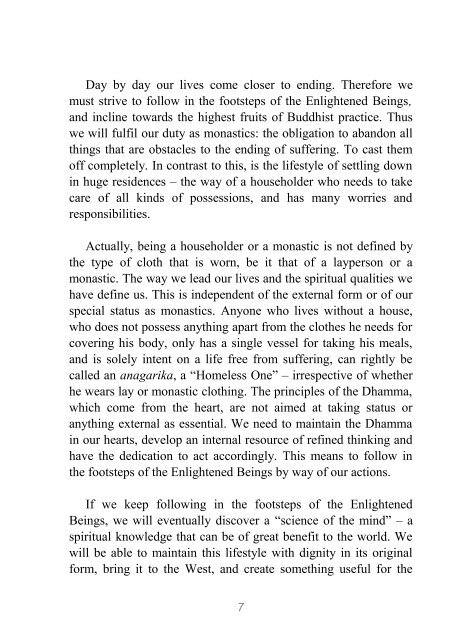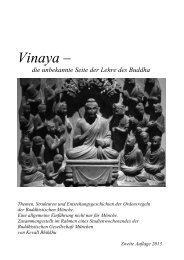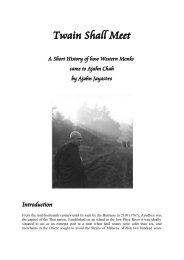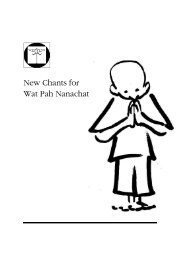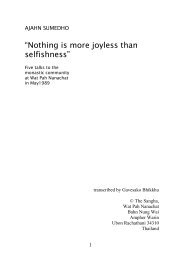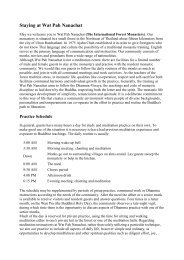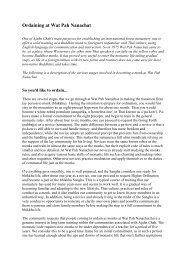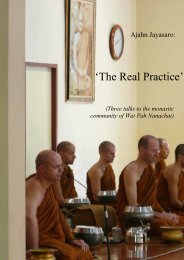Luang Por Liem: The Ways of the Peaceful - Wat Pah Nanachat
Luang Por Liem: The Ways of the Peaceful - Wat Pah Nanachat
Luang Por Liem: The Ways of the Peaceful - Wat Pah Nanachat
You also want an ePaper? Increase the reach of your titles
YUMPU automatically turns print PDFs into web optimized ePapers that Google loves.
Day by day our lives come closer to ending. <strong>The</strong>refore we<br />
must strive to follow in <strong>the</strong> footsteps <strong>of</strong> <strong>the</strong> Enlightened Beings,<br />
and incline towards <strong>the</strong> highest fruits <strong>of</strong> Buddhist practice. Thus<br />
we will fulfil our duty as monastics: <strong>the</strong> obligation to abandon all<br />
things that are obstacles to <strong>the</strong> ending <strong>of</strong> suffering. To cast <strong>the</strong>m<br />
<strong>of</strong>f completely. In contrast to this, is <strong>the</strong> lifestyle <strong>of</strong> settling down<br />
in huge residences – <strong>the</strong> way <strong>of</strong> a householder who needs to take<br />
care <strong>of</strong> all kinds <strong>of</strong> possessions, and has many worries and<br />
responsibilities.<br />
Actually, being a householder or a monastic is not defined by<br />
<strong>the</strong> type <strong>of</strong> cloth that is worn, be it that <strong>of</strong> a layperson or a<br />
monastic. <strong>The</strong> way we lead our lives and <strong>the</strong> spiritual qualities we<br />
have define us. This is independent <strong>of</strong> <strong>the</strong> external form or <strong>of</strong> our<br />
special status as monastics. Anyone who lives without a house,<br />
who does not possess anything apart from <strong>the</strong> clo<strong>the</strong>s he needs for<br />
covering his body, only has a single vessel for taking his meals,<br />
and is solely intent on a life free from suffering, can rightly be<br />
called an anagarika, a “Homeless One” – irrespective <strong>of</strong> whe<strong>the</strong>r<br />
he wears lay or monastic clothing. <strong>The</strong> principles <strong>of</strong> <strong>the</strong> Dhamma,<br />
which come from <strong>the</strong> heart, are not aimed at taking status or<br />
anything external as essential. We need to maintain <strong>the</strong> Dhamma<br />
in our hearts, develop an internal resource <strong>of</strong> refined thinking and<br />
have <strong>the</strong> dedication to act accordingly. This means to follow in<br />
<strong>the</strong> footsteps <strong>of</strong> <strong>the</strong> Enlightened Beings by way <strong>of</strong> our actions.<br />
If we keep following in <strong>the</strong> footsteps <strong>of</strong> <strong>the</strong> Enlightened<br />
Beings, we will eventually discover a “science <strong>of</strong> <strong>the</strong> mind” – a<br />
spiritual knowledge that can be <strong>of</strong> great benefit to <strong>the</strong> world. We<br />
will be able to maintain this lifestyle with dignity in its original<br />
form, bring it to <strong>the</strong> West, and create something useful for <strong>the</strong><br />
7


